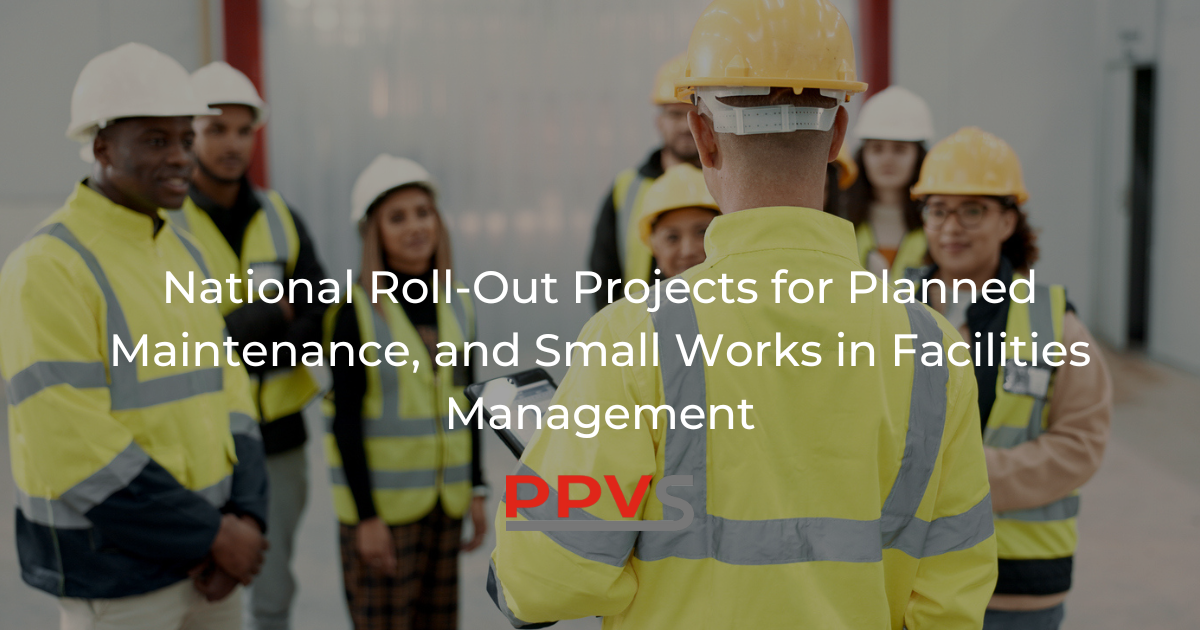PPVS Complete Facilities Management

What are the Benefits of Planned Maintenance & Why is it Important?
Planned maintenance refers to the systematic approach of regularly inspecting, servicing, and repairing assets and equipment to ensure their optimal functioning and prolonging their lifespan. This proactive maintenance strategy offers numerous benefits to businesses across various industries. In this article, we will explore the importance of planned maintenance and the advantages it provides.
Reduces Downtime
One of the key benefits of a planned maintenance service is its ability to significantly reduce downtime. By conducting routine inspections and servicing, potential issues can be identified and addressed before they escalate into major problems that require extensive repairs or replacements. Timely maintenance helps prevent unexpected breakdowns and unplanned shutdowns, allowing businesses to maintain continuous operations and meet production targets. This reduction in downtime ultimately leads to increased productivity.
Maximises Productivity
A planned maintenance service plays a crucial role in maximising productivity. When equipment is well-maintained and operating efficiently, it leads to improved performance and reduced disruptions. Regular servicing helps identify and rectify issues that could potentially hamper productivity. By ensuring that assets are in optimal condition, planned maintenance work helps organisations achieve higher output levels and meet production and operation goals consistently.
Cost Savings
Implementing a planned maintenance service program can result in significant cost savings for companies. By identifying and addressing maintenance needs before they escalate, businesses can avoid costly emergency repairs or replacements. Planned maintenance work allows for better resource allocation and budgeting, as expenses can be forecasted and planned in advance. Moreover, by extending the lifespan of assets through regular maintenance, organisations can delay the need for new equipment purchases, thereby reducing capital expenditure.
Longer Asset Lifespans
Assets and equipment are significant investments for any organisation, and maximising their lifespan is crucial for profitability. A Planned maintenance service helps achieve this objective by ensuring that assets are kept in optimal condition throughout their operational life. Regular inspections, lubrication, cleaning, and adjustments can prevent premature wear and tear, corrosion, and degradation. By extending asset lifespans, companies can realise a higher return on their investments and reduce the frequency of expensive replacements.
Increased Organisation
A well-structured planned maintenance work program enhances the overall organisation of an operation. It provides a systematic approach to asset management by scheduling inspections, servicing, and repairs in advance. This structured approach minimises the risk of overlooking maintenance tasks and ensures that they are carried out in a timely manner. Planned maintenance work also facilitates better inventory management of spare parts and consumables, reducing the likelihood of delays caused by unavailability.
Improved Budget Management
Effective budget management is essential for any business, and planned maintenance work supports this endeavour. By implementing a planned maintenance program, organisations can accurately estimate and allocate resources for routine inspections, servicing, and repairs. This proactive approach helps prevent unexpected and costly maintenance expenses, allowing for better financial planning. Moreover, planned maintenance reduces the likelihood of major breakdowns and their associated expenses, contributing to overall budget stability.
Statutory & Recommended Maintenance
Statutory maintenance in the UK covers various essential services and inspections to ensure the safety and functionality of buildings. These maintenance tasks typically include:
Monthly fire alarm and emergency lighting checks: Regular checks are conducted to verify that fire alarms and emergency lighting systems are in proper working order, reducing the risk of fire-related incidents.
Water treatment services: Water systems need to be regularly monitored and treated to prevent the growth of bacteria and ensure water quality meets health and safety standards.
Annual roller shutter maintenance: Roller shutters, commonly used for security purposes, require annual maintenance to ensure smooth operation and address any issues that may arise.
Annual HVAC maintenance: Heating, ventilation, and air conditioning (HVAC) systems are serviced annually to optimise their performance, improve energy efficiency, and address any potential faults.
Lightning protection: Lightning protection systems are inspected periodically to confirm their effectiveness in safeguarding structures from lightning strikes.
Electrical testing: Regular electrical testing, such as periodic inspections and Portable Appliance Testing (PAT), is crucial to identify and rectify potential electrical hazards.
In addition to statutory maintenance, there are recommended maintenance tasks that can enhance the overall upkeep of a building:
Six-monthly gutter cleans: Cleaning gutters twice a year helps prevent blockages, water damage, and potential structural issues caused by overflowing or leaking gutters.
PPM (Planned Preventative Maintenance) for grease traps: Regular maintenance of grease traps ensures proper functioning and prevents the buildup of grease, minimising the risk of blockages and unpleasant odours.
Drainage macerator pump maintenance: Macerator pumps, often used in areas where conventional drainage is not possible, require regular maintenance to prevent clogging and ensure optimal operation.
It is important to note that specific maintenance requirements may vary depending on the type of building, its use, and local regulations. It is advisable to consult relevant authorities and professionals to determine the exact statutory and recommended maintenance tasks for a particular property.
PPVS Offers a Range of Planned Maintenance Services
To reap the benefits of planned maintenance, organisations can rely on the expertise and services of professional providers, like ourselves here at PPVS, who offer a comprehensive range of planned maintenance services tailored to the specific needs of businesses. Our skilled technicians and engineers can develop customised maintenance plans, perform routine inspections, and carry out necessary repairs and servicing, ensuring that assets are well-maintained and reliable.
With PPVS’s planned maintenance services, organisations can benefit from comprehensive asset management plans that cover everything from equipment inspections to calibration and performance optimisation. By entrusting their maintenance needs to experts, businesses can focus on their core operations while ensuring that their assets are well-maintained and reliable.
PPVS’s planned maintenance services also offer the advantage of flexibility. We understand that different organisations have unique requirements and constraints, and provide customised maintenance plans that align with specific business goals, budgets, and operational schedules. Our tailored approach ensures that maintenance activities are carried out at the most opportune times, minimising interference with production schedules and maximising operational efficiency.
Planned Maintenance Ultimately Optimises Businesses
As you can see, a planned maintenance service is a proactive and systematic approach to asset management that offers numerous benefits to organisations. By reducing downtime, maximising productivity, achieving cost savings, extending asset lifespans, increasing organisation, and improving budget management, planned maintenance contributes to the overall efficiency, profitability, and success of businesses. With the assistance of professional service providers like PPVS, companies can access a wide range of planned maintenance services and leverage the expertise of skilled professionals to optimise their maintenance strategies and achieve long-term operational success.

Get in touch to see how we can help with your Facilities Management.
For general enquiries please fill out the form and our team will be back in touch. Or give us a call or email using the details below.







